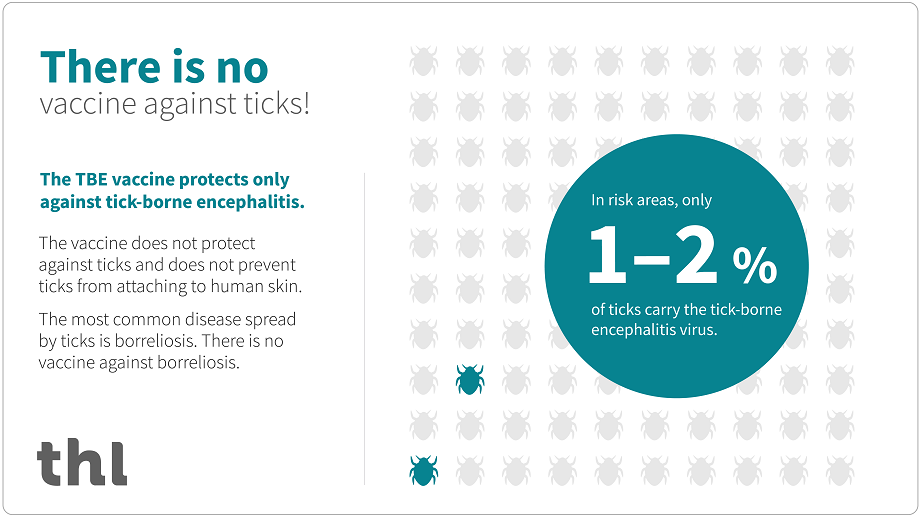Significant increase in cases of tick-borne encephalitis last year – national vaccination programme expands to various locations
In 2023 a total of 160 cases of tick-borne encephalitis (TBE) were reported to the National Infectious Diseases Register by the end of September, which is 37 more than in the previous year. In 2022, 123 TBE cases were reported to the register throughout the year, while there were 148 cases in 2021 and less than 100 in the years before that.

Based on the monitoring data from the period 2019–2023, the incidence of TBE has been highest in coastal regions, more specifically in the municipalities of Kustavi (67 cases per 100,000 inhabitants) and Pargas (45/100,000) and the province of Åland (35/100,000). In these areas, the high risk of the disease has been known for a long time.
“The majority of infections have been diagnosed in persons who did not have protection from vaccinations. That is why it is important to ensure protection from vaccinations especially when living in an area included in the national vaccination programme,“ says Henna Mäkelä, researcher at the Finnish Institute for Health and Welfare (THL).
2023 is not fully comparable with previous years
In previous years, the prevalence of tick-borne encephalitis has been monitored every calendar year, but from now on, a new monitoring period will always start at the turn of September and October. As a result of this change, the 2023 monitoring period was exceptionally only nine months, from January to September, which is why it is not fully comparable to previous years. Despite the shorter monitoring period than normal, more cases were reported than in the previous calendar year.
"The aim with changing the monitoring period is to ensure that vaccination recommendations can be reviewed and updated earlier than before. This way, people living in at-risk areas will have more time to get extensive protection from vaccinations before ticks become active in the spring. The first two vaccines in the vaccinations series should be taken early in the year, when there is still snow on the ground," says Mäkelä.
New Finnish areas to be included in the vaccination programme
This year, the national vaccination programme for TBE will expand to various areas. The new additions are the municipality of Tohmajärvi, the postal code area of Kuusimäki-Lavola (53810) in Lappeenranta, the postal code area of Bromarv (10570) in Raseborg and the Karhusaari Island in Helsinki are included.
The area covered by the vaccination programme will also expand in Kemi to cover the entire postal code areas of Takajärvi-Haukkari (94700), Pikku Berliini-Hepola (94830), Veitsiluoto (94800), Ajos (94900) and Peurasaari (94720).
In addition to the above, the national programme for TBE vaccinations will continue in Åland, Pargas, Simo, the southern parts of Kemi, the Kotka archipelago, the Suvisaaristo archipelago in Espoo, the Sammonlahti district of Lappeenranta, the island of Preiskari near Raahe, Kustavi, the Sipoo archipelago, the Ojamo (08200), Lylyinen/Hormajärvi (08450), Vohloinen/Virkkala (08700) and Kirkniemi (08800) postal code areas in Lohja and the Luoma (02440) and Masala (02430) postal code areas in Kirkkonummi.
Permanent residents and long-term holiday residents in the areas are entitled to vaccinations
Vaccinations under the national vaccination programme are free of charge and are available to all permanent residents and long-term holiday residents aged three or over in the area. The more a person spends time in nature, the more necessary the vaccine is for them.
The basic vaccination series includes three vaccine doses. The vaccination series should start no later than at the beginning of spring so that two doses can be administered before the summer. The third dose is administered 9 to 12 months after the second dose.
TBE vaccinations under the national vaccination programme are only administered in wellbeing services counties that have areas included in the vaccination programme. The wellbeing services counties will inform residents on how vaccinations are organised.
For the moment, the booster doses required after the basic series are not included in the national vaccination programme. This is why the person wishing to receive a booster must pay for it themselves. Getting the first booster is recommended three years after the basic series.
Updates to vaccination recommendations for areas outside the vaccination programme
THL also issues vaccination recommendations for areas outside the national vaccination programme where the risk is not as high as in the areas covered by the programme. The recommendations have also been updated for 2024. In these areas, people who wish to be vaccinated pay for the vaccination series themselves. Many municipalities around archipelagos and along the coast in particular are risk areas of tick-borne encephalitis.
You can see the number of cases and the TBE vaccination recommendations for each municipality in the map application available on the THL website (in Finnish).
Protect yourself against tick bites
The TBE vaccine protects only against the tick-borne encephalitis caused by a virus. The vaccine does not protect against other diseases transmitted by ticks, such as borreliosis, and does not prevent ticks from attaching to the skin. All diseases spread by ticks can be prevented by protecting yourself against tick bites.
"When moving about in areas where ticks are present, it is a good idea to wear light-coloured clothes with long sleeves and trouser legs and pull your socks over the trouser legs. An insect repellent that works on ticks can provide additional protection, as can daily tick inspections. It is particularly effective against the Borrelia bacteria, which are significantly more common than TBE in Finland.
"However, fear of tick-borne diseases is not a good reason to restrict your activities in nature. The health benefits of moving about outdoors are much greater than the risks caused by ticks," Mäkelä points out.
More information
What is tick-borne encephalitis? (THL, in Finnish)
TBE vaccinations outside the vaccination programme (THL, in Finnish)
The difference between tick-borne encephalitis and borreliosis (THL blog 16 March 2021, in Finnish)
Henna Mäkelä
Researcher
THL
tel. +358 (0)29 524 7488
[email protected]
Anniina Virkku (vaccinations)
Medical Specialist
THL
[email protected]



